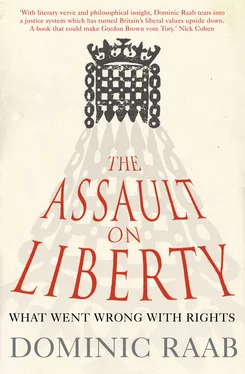More recently, Lord Dear, former Chief Constable of West Midlands Police and a former Chief Inspector of Constabulary, delivered an even starker warning:
Make no mistake, extending pre-charge detention would most certainly be a propaganda coup for al-Qaida…The immediate danger if we travel down this road is that we will lose the battle for hearts and minds abroad, and particularly in the minority groups in this country, whose long-term support is vital if we are to counter and remove the threat of terrorism.
Even the government’s own Security Minister, Lord West, expressed concerns about extending pre-charge detention before being forced to retract them by the Prime Minister:
I want to have absolute evidence that we actually need longer than 28 days. I want to be totally convinced because I am not going to go and push for something that actually affects the liberty of the individual unless there is a real necessity for it. I still need to be fully convinced that we absolutely need more than 28 days and I also need to be convinced what is the best way of doing that.
A growing list of security experts, with front-line experience in the fight against terrorism, are warning that extending pre-charge detention will aggravate, not mitigate, the terrorist threat level.
The second security risk in extending pre-charge is that it will cut off the flow of human intelligence to the police. In 2007, the head of counter-terrorism at the Metropolitan Police, Peter Clarke, made the case publicly that improving public understanding and trust represents the greatest current challenge we face in addressing the terrorist threat. While Clarke supported the Metropolitan Police’s line in favour of forty-two days, he has also pointed out that very few terrorism prosecutions originate from ‘community intelligence’ – namely members of local communities coming forward to the police with information or cooperation about suspected terrorist activity. This is in marked contrast to the high level of cooperation and intelligence derived from local communities in France and other countries. Clarke warned that: ‘…the lack of public trust in intelligence is in danger of infecting the relationship between the police and the communities we serve. Trust and consent are two concepts that lie at the heart of the relationship between the British police and the public.’
It is increasingly evident that the disproportionate impact of police powers on the Muslim community risks undermining their confidence in and cooperation with the police and security services. This has a direct bearing on our operational capability, choking off vital ‘community intelligence’, which is critical to counter-terrorism investigations. Even the government’s own impact assessment, accompanying the proposal for forty-two days, acknowledges this: ‘Muslim groups said that pre-charge detention may risk information being forthcoming from members of the community in the future.’
The real risk is that further extending pre-charge detention will not just sacrifice the fundamental freedoms of the citizen but also harm our security, both by increasing the radicalization of disaffected young Muslim men, and alienating the local communities whose active cooperation is pivotal to the counter-terrorism effort. Far from involving a delicate balance between collective security and individual liberty, as a security measure forty-two days’ pre-charge detention is unnecessary, if not counter-productive. That is not a trade-off – it is just lose-lose.
In contrast, senior counter-terrorism officers report that one of the most positive developments, helping to combat the climate in which radicalization thrives, has been the recent string of criminal convictions in terrorism cases. Nervous Muslim communities were alarmed by the armed raid in Forest Gate, London, in 2006, which was based on mistaken intelligence relating to a potential chemical bomb attack. Wild conspiracy theories circulated suggesting that the raid was part of a propaganda exercise to hype up the public perception of the terrorist threat. As spurious as these claims were, the subsequent public conduct of trials in other terrorism cases – and the convictions that followed – helped demonstrate, to even the most sceptical quarters, that the UK’s struggle against terrorism is all too real. That in turn has improved the confidence of, and cooperation from, Muslim communities. Peter Clarke argues: ‘The series of terrorist convictions in recent years has been a victory for the rule of law and sends out a strong, positive signal to all communities.’
Again, it is striking that the open and transparent conduct of these criminal cases – through a British justice system that respects fundamental rights – has not only resulted in the long-term incarceration of dangerous terrorists, but also had a positive impact on the climate in which police counter-terrorism operations take place.
It is a popular myth that we now face the dilemma of weighing security considerations against the liberty of the individual. In fact, the publicly available evidence on both sides of this debate points broadly in the same direction. Sustaining the fundamental liberties every individual enjoys in this country as of right provides one of our most important tools in refuting propaganda from Islamic radicals and terrorists. Protecting the fundamental freedoms of all British citizens is critical to puncturing the myths propagated by extremists and ensuring cooperation between local Muslim communities and the police, which is in turn vital to the UK’s counter-terrorism capability.
In addition to these security risks, the government’s fixation on pre-charge detention has also distracted its political focus and energies from a range of other much needed measures, which could strengthen our operational counter-terrorism edge. If the government had expended a fraction of the political capital that it has squandered on forty-two days on these measures it could have strengthened national security without sacrificing British liberties.
Take just three examples. First, removing the ban on using intercept evidence in court would help the police gather evidence that could be used in trial proceedings. Almost every other country in the world has overcome security concerns to allow the use of intercept evidence in court to prosecute terrorists. In the UK, intercept evidence can be used in deportation proceedings, control order cases and applications to court to freeze terrorist assets. But despite numerous reviews, British prosecutors – virtually alone in the world – are still banned from using intercept evidence to convict terrorists in court. In its obsession with forty-two days, the government has neglected a valuable tool that would put terrorists behind bars without undermining the freedom of the innocent.
Second, allowing police to question terrorist suspects after they have been charged would take some of the pressure off the police during the pre-charge investigation period. There have been calls for the introduction of post-charge questioning for several years, but the government inexplicably delayed until 2008 before making any formal proposals in this regard.
Third, one of the arguments used to support the case for extending pre-charge detention is that evidence on computer hard drives may be encrypted and take time to decipher. In response, Parliament created a criminal offence for withholding encryption keys and computer passwords, allowing prosecutors to charge and imprison suspects for obstructing an investigation in this way. By the time of the vote on forty-two days in 2008, there were still no convictions under this new power, despite repeated reliance by the government on the volume and encryption of computer data in terrorism investigations as part of its case for extending pre-charge detention.
Читать дальше












